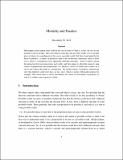Modality and paradox
Abstract
Philosophers often explain what could be the case in terms of what is, in fact, the case at one possible world or another. They may differ in what they take possible worlds to be or in their gloss of what is for something to be the case at a possible world. Still, they stand united by the threat of paradox. A family of paradoxes akin to the set-theoretic antinomies seem to allow one to derive a contradiction from apparently plausible principles. Some of them concern the interaction between propositions and worlds, and they appear to afford the means to map classes of propositions into propositions—or, likewise, classes of worlds into worlds—in a one-to-one fashion that leads to contradiction. Yet another family of paradoxes threaten the view that whatever could exist does, in fact, exist, which is in line with modal realism, for example. This article aims to survey and identify the source of each family of paradoxes as well as to outline some responses to them.
Citation
Uzquiano , G 2015 , ' Modality and paradox ' , Philosophy Compass , vol. 10 , no. 4 , pp. 284-300 . https://doi.org/10.1111/phc3.12223
Publication
Philosophy Compass
Status
Peer reviewed
ISSN
1747-9991Type
Journal article
Collections
Items in the St Andrews Research Repository are protected by copyright, with all rights reserved, unless otherwise indicated.

